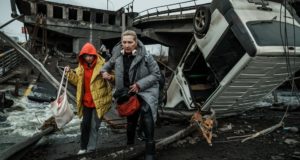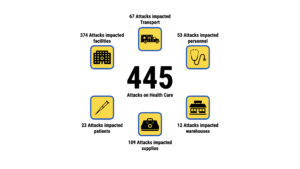HSC study shows toll on health care in Ukraine since start of war
 Dr. Ubydul Haque, an assistant professor of biostatistics and epidemiology at The University of North Texas Health Science Center at Fort Worth’s School of Public Health, is delving into how Russia’s invasion of Ukraine has impacted health care through an in-depth piece recently published in BMJ Global Health, a peer-reviewed journal.
Dr. Ubydul Haque, an assistant professor of biostatistics and epidemiology at The University of North Texas Health Science Center at Fort Worth’s School of Public Health, is delving into how Russia’s invasion of Ukraine has impacted health care through an in-depth piece recently published in BMJ Global Health, a peer-reviewed journal.
Beginning Feb. 24 (the day Russia launched its attack) through Aug. 4, Haque’s study of the first 162 days of the war represents the first attempt to track direct deaths and injuries, as well as the impact of the damage to Ukraine’s health care infrastructure. The study also delves into the war’s impact on public health, including the destruction of homes, community infrastructure — buildings, roads and power supplies — communication systems and utility services.
“My heart broke to see the human suffering,” Haque said of his research. “I found this is one of the major public health disasters of the 21st century. I’m also afraid the war will have a long-term public health impact in Ukraine and beyond. That prompted me to generate this database and write this manuscript.”
The disruption to water, gas, electricity and internet services also affected access to medications and other supplies, as vital factories and other facilities were destroyed or forced to cease production, he said. The report includes information about deaths directly from missile attacks on hospitals, residential buildings, dams, bridges, churches, schools, a TV tower, theater and power plants.
Haque collected data for the study from online and printed news outlets published in English and Ukrainian. The piece also provides data about the impact of human rights violations by Russian forces, including missing or unaccounted-for civilians.
The health care crisis in Ukraine
The Ukrainian health care system was suffering before Russia’s invasion, Haque said. The country was dealing with a lack of funding, inequities in the distribution of resources and remote hospital locations with limited access. Now, increasing costs, logistical hurdles and a decimated infrastructure are making it even more difficult for people to access basic health care. Russian attacks on health facilities — including children’s hospitals and maternity wards — have exacerbated these challenges.
Hospitals and health facilities from 21 cities across Ukraine came under attack during the duration of the study, Haque said. Hospitals alone were targeted 78 out of the 162 days.
With limited access to health care, the war has created a “treatment gap” for Ukrainian children with serious, chronic conditions, he said. On top of that, the country has experienced a significant uptick in cases of HIV/AIDs, tuberculosis and COVID-19, as public health prevention has been halted in the hardest-hit areas.
The death toll
As of Aug. 4, Haque found that more than 5,550 Ukrainian civilians were killed with another 8,513 injured by Russian attacks. Local officials have estimated as many as 24,328 people have been killed in mass atrocities.
Russian forces shelled Ukrainian military and nonmilitary targets in 145 out of 162 days covered in Haque’s work. Attacks that involved shelling accounted for the most deaths — 49,66 fatalities — or nearly 90% of all deaths.
There wasn’t a single day of the war’s first year that didn’t include attacks on civilian homes. As of Aug. 1, more than 123,000 homes were destroyed by Russian attacks, Haque said.
Aside from health care-related targets, Haque recorded at least 250 attacks on nonmilitary infrastructure that diminished the safety and well-being of Ukrainians and compounded the humanitarian crisis. There were attacks in 82 different cities, villages and municipalities, and those targets ranged from museums and playgrounds to bridges and airports. There also were five attacks on nuclear plants. The electricity supply was disrupted in 15 cities, and the water supply was impacted in eight cities.
The most damaging legacy of the war could be its impact on mental health, Haque said. Almost 10 million people are potentially at risk of mental disorders, such as acute stress, anxiety, depression, substance use and post-traumatic stress disorder or PTSD.
“The Russia-Ukraine War has not only resulted in deaths and injuries but also impacted the lives and safety of Ukrainians through destruction of health care facilities and disrupted delivery of services and supplies,” Haque said. “The war is an ongoing humanitarian crisis given the continuing destruction of infrastructure and services that directly impact the well-being of human lives. The devastation, trauma and human cost of war will impact generations of Ukrainians for many, many years to come.”
Haque said he hopes his study informs public health preparedness on health care infrastructure that has been severely impacted by the war and creates a conversation about ways to prioritize health care delivery in the country. The mental health of Ukrainians, he added, should be a priority going forward.
“The exact number of injured and dead may never be fully known given the unmarked mass graves,” Haque said, “Continued surveillance and support is imperative to help mediate the long-term effects of the war and to rebuild Ukraine.”
Contributing authors to the publication were HSC’s School of Public Health Ph.D. student Shanshan Wang; MS student Rebeca Galindo and recent graduate, Dr. Esther Annan; and SPH professor, Dr. Uyen-Sa D T Nguyen.





Social media